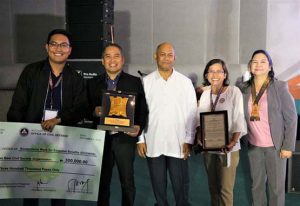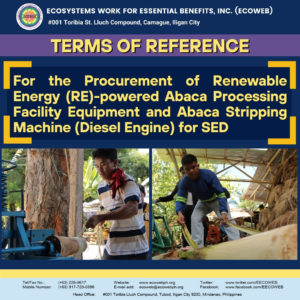“How did the abaca plantation and its social enterprise change us?
It changed me and my companions dramatically. We used to be full of vices; deficient in knowledge on farming; and about to lose direction in where we’d lead our lives to. It struck us that income inspires confidence and makes it a little bit comfortable for us to buy our home and children’s necessities. Our collective engagement in abaca farming and its trading gave sense of purpose. We recovered our sense of self-respect and respect for others. Despite all difficulties, we persevered in helping each other– especially now that we have the social enterprise to manage –this buying and selling of abaca fiber with an initial capitalization from EcoWEB and its partners. It truly helped make sense of what we are these days. We are more focused now and there is hope to attain a better life. The future seems brighter for all of us.”
Barte Egbao, 33 years old Higaonon farmer with 5 children, related this with other farmers one morning in a serious discussion about managing an organization and a social enterprise, as they gathered inside the center of the Salvador Migsabua Farmers Association in barangay Rogongon, about 18 kilometers away from the commercial center of Iligan city,
“My first abaca fiber harvest only earned ₱ 1,500 ($30). Recently, I have earned ₱ 20,000 ($400). My friend Rudy has already earned ₱33,000 ($660) from his harvest. If the abaca plantation sustainably thrives well, we would be continuously harvesting our produce.,” Egbao, one of the community leaders of the farmers’ association, said.
Egbao narrated this in heartfelt sincerity as one of those who benefited from the implementation of the on-going three-year project of ECOWEB entitled the Formation of Production Guild and Social Enterprises for Economic Development of Indigenous Communities (FPGSEEDIC) which intends to contribute to the sustainable development of the three Ancestral Domains of Indigenous People in North-Western Mindanao. The project is getting funding support from the Bread for the World of Germany.
Egbao’s group is among the 33 abaca production guilds assisted by the project that promotes gender inclusion in developing resilience and farm productivity and in the farmers’ capacity in forming their community social enterprises. The project aims to contribute in creating sustainable development of the ancestral domain of Indigenous Peoples – of Higaonon in Bayug, Iligan and Dulangan ancestral domains in Misamis Oriental and of Subanen ancestral domain in Bayog, Zamboanga del Sur.
Through it, the association availed seminars, training, initial capitalization for the social enterprise, construction of the abaca fiber storage, and provision of farm tools and establishment of abaca nursery.
“We learned to classify abaca fiber, its processes, and the market prices. Our wives got involved in tuxying the abaca pulps, and in our nutrition, as well as in business and financial management of the mini-grocery store also supported by EcoWEB,” said Egbao. EcoWEB through the funding support of AVPN-KKR COVID-19 fund, is also implementing a no-interest Revolving Loan Fund to support the livelihood recovery of communities from the impact of COVID-19.
Egbao further explained, “we resolve our issues during regular meetings. Those who later decide to dismember themselves from the organization because they cannot conform to internal policies and by-laws are asked to sign a document. We believed that every person has the right to association and the right to get out. Gawasnon ka nga musulod, gawasnon pud ka nga mugawas (You are free to get in; you are free to get out.) We lead with humility and understanding; otherwise, the group will become disorganized.”
Exemplifying their experience with others, Egbao narrated, “currently we have a reserve fund of ₱ 2,000 from our monthly dues collection, a meager amount from the membership fee, and the guild’s income from the sale of abaca fibers. We used the fund for immediate travels relating to meetings. It can be loaned with little interest to members who are in dire emergency needs. If unspent, this will be redistributed to the members at the end of the year. As a form of disciplinary measure, absent members are asked to pay ₱ 100.”
“We realized that when government agencies learned that we have an organized community, they can readily approach us. We have experienced this from the Department of Agriculture (DA), Mindanao State University (MSU), and the Department of Science and Technology (DOST) who thought of helping improve our fiber production,” he added.
The organization hopes to expand their abaca farm to cover 100 hectares as they will work to slowly transition into a cooperative, and target to produce 30 tons of abaca per month.
Fgure 3 Egbao stood in the farmers’ community center cum facility for their social enterprise in abaca trading with their mini-grocery store (VMG).
Aside from abaca, farmers indulged themselves in the diversification of agricultural outputs through faith gardening, for upland rice production, root crops, and livestock raisings like chicken.
“As we develop, the organization sees the necessity to access and make portable spindles accessible to all farmers working in their fields. With our humble enterprise, we need to be adaptive to the market. More training to hone our skills in leadership and social enterprise will improve our capacities,” said Egbao.
“While we acknowledge that there are tensions and jealousies among members sometimes, we tend to ignore and refuse to escalate it with unnecessary comments. We respond calmly and rightly,” he expressed.
They are also aware of disturbance in other parts of the hinterland which caused serious panic and concern among farmers in the neighboring communities especially when violent conflicts and displacement happened intermittently within the ancestral domain.
Like the rest of the indigenous communities in the hinterland, these farmers hope that indigenous peoples’ governance, traditional values, and customary laws within the ancestral domain are implemented and respected by everyone.
They believed that the community should have functional indigenous people’s structures and governance and they hope to have continuing study of the Indigenous Peoples Rights Act (IPRA). (Violeta M. Gloria)








